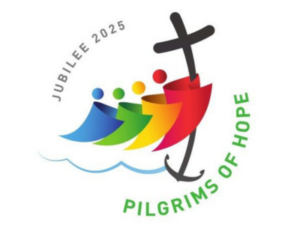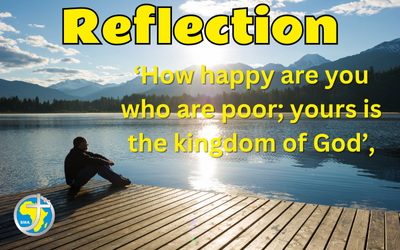A reflection for the Sixth Sunday (Cycle C)
The difference between Luke’s so-called Sermon on the Plain and Matthew’s version on the Mount is more than a matter of location and length, it is also one of emphasis. Luke’s list leads with ‘How happy are you who are poor; yours is the kingdom of God’, a version very different from Matthew’s ‘Blessed are the poor in spirit’ which people are probably more familiar with from hearing it at funerals and for which it feels most appropriate.
The poor are not happy as anyone who has escaped from its empty net will tell. Luke’s half line does not herald approval for austerity measures in society or abandonment of international aid programmes. The blessing for the poor is balanced by the word of warning to the wealthy, ‘Alas for you who are rich’. Indeed Luke is the evangelist who exclaims Jesus’ stance on wealth which is expressed in many examples, such as the commitment by the converted Zacchaeus to repay what he has extracted unjustly and, especially, in the parable of Dives and Lazarus in which the rich man is destined to eternal damnation. While there may be an element of eschatological exaggeration here the message is clear – material wealth on earth is a barrier to eternal blessedness. The late scripture scholar Daniel J. Harrington summarises the meaning of the parable succinctly, ‘as share what you have now, before it is too late’.[1]
The context for calling the poor ‘happy’ is the pledge by Jesus ‘yours is the kingdom of God’. The ‘kingdom of God’ is the subject of Jesus’ teaching and preaching, particularly dynamic in the parables that point to God’s presence in the world and purpose for people. The Kingdom/Reign reveals the power of God, active in the miracles of healing and over nature. Pope Francis declares that ‘God’s heart has a special place for the poor…shows the poor his “first mercy” and ‘That is why I want a Church which is poor and for the poor’.[2] More than an option from outside, God has chosen to identify with the poor as pointed out by his predecessor Pope Benedict, ‘our Christian faith [is] in a God who became poor for us, so as to enrich us with his poverty’.[3] This divine exchange does not deal in earthly economics but in the mystery of mercy which, like Jesus’ words about forgiveness, ‘seventy-seven times’, that is, infinitely exceeds the terms and conditions of market forces.
 In this Jubilee Year of Hope highlighting the poor is hazardous, even hard hearted without any hint of amelioration in their circumstances. Paul’s half-line, ‘if our hope in Christ has been for this life only’ does not deny the need to decrease inequality and injustice in all its indices individually and internationally while at the same time declaring that hope is ultimately put into the hands of God. How hopeful are the poor for theirs is the kingdom of God is not an evasion from earthly realities and responsibility for making the world a better place, ethically, economically and ecologically while expressing – in the words of Jeremiah today – ‘A blessing on the person who places his trust in the Lord, with the Lord for her hope’.
In this Jubilee Year of Hope highlighting the poor is hazardous, even hard hearted without any hint of amelioration in their circumstances. Paul’s half-line, ‘if our hope in Christ has been for this life only’ does not deny the need to decrease inequality and injustice in all its indices individually and internationally while at the same time declaring that hope is ultimately put into the hands of God. How hopeful are the poor for theirs is the kingdom of God is not an evasion from earthly realities and responsibility for making the world a better place, ethically, economically and ecologically while expressing – in the words of Jeremiah today – ‘A blessing on the person who places his trust in the Lord, with the Lord for her hope’.
Fr Kevin O’Gorman SMA
[1] Meeting St Luke Today, Chicago: Loyola Press, 2009, 49.
[2] Evangelii Gaudium – The Joy of the Gospel, 2013, pars. 197, 198.
[3] Ibid., par 198.

